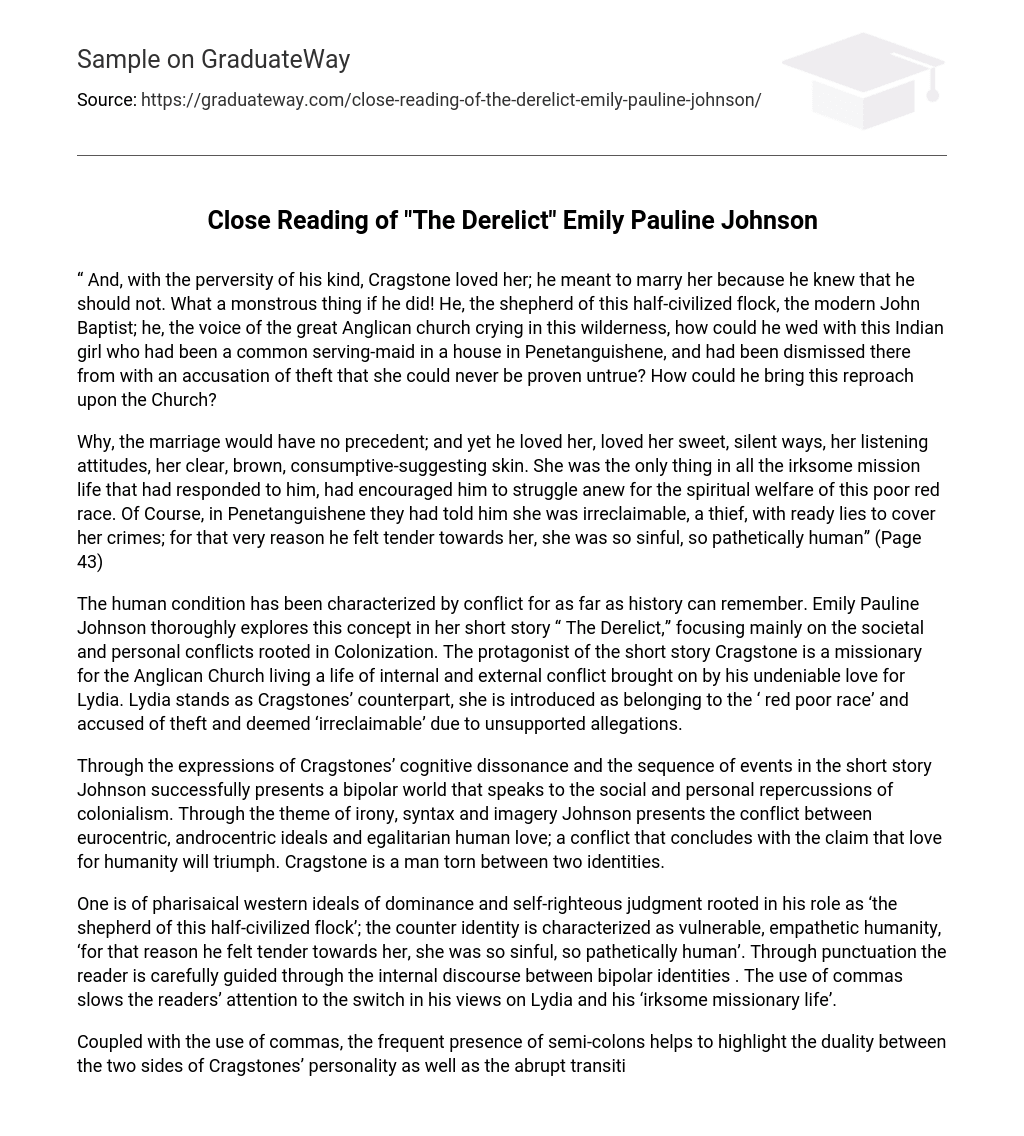“ And, with the perversity of his kind, Cragstone loved her; he meant to marry her because he knew that he should not. What a monstrous thing if he did! He, the shepherd of this half-civilized flock, the modern John Baptist; he, the voice of the great Anglican church crying in this wilderness, how could he wed with this Indian girl who had been a common serving-maid in a house in Penetanguishene, and had been dismissed there from with an accusation of theft that she could never be proven untrue? How could he bring this reproach upon the Church?
Why, the marriage would have no precedent; and yet he loved her, loved her sweet, silent ways, her listening attitudes, her clear, brown, consumptive-suggesting skin. She was the only thing in all the irksome mission life that had responded to him, had encouraged him to struggle anew for the spiritual welfare of this poor red race. Of Course, in Penetanguishene they had told him she was irreclaimable, a thief, with ready lies to cover her crimes; for that very reason he felt tender towards her, she was so sinful, so pathetically human” (Page 43)
The human condition has been characterized by conflict for as far as history can remember. Emily Pauline Johnson thoroughly explores this concept in her short story “ The Derelict,” focusing mainly on the societal and personal conflicts rooted in Colonization. The protagonist of the short story Cragstone is a missionary for the Anglican Church living a life of internal and external conflict brought on by his undeniable love for Lydia. Lydia stands as Cragstones’ counterpart, she is introduced as belonging to the ‘ red poor race’ and accused of theft and deemed ‘irreclaimable’ due to unsupported allegations.
Through the expressions of Cragstones’ cognitive dissonance and the sequence of events in the short story Johnson successfully presents a bipolar world that speaks to the social and personal repercussions of colonialism. Through the theme of irony, syntax and imagery Johnson presents the conflict between eurocentric, androcentric ideals and egalitarian human love; a conflict that concludes with the claim that love for humanity will triumph. Cragstone is a man torn between two identities.
One is of pharisaical western ideals of dominance and self-righteous judgment rooted in his role as ‘the shepherd of this half-civilized flock’; the counter identity is characterized as vulnerable, empathetic humanity, ‘for that reason he felt tender towards her, she was so sinful, so pathetically human’. Through punctuation the reader is carefully guided through the internal discourse between bipolar identities . The use of commas slows the readers’ attention to the switch in his views on Lydia and his ‘irksome missionary life’.
Coupled with the use of commas, the frequent presence of semi-colons helps to highlight the duality between the two sides of Cragstones’ personality as well as the abrupt transitions: “Why the marriage would have no precedent; and yet he loved her, loved her sweet, silent ways, her listening attitudes, her clear, brown, consumptive-suggesting skin. ” The language used follows the theme of duality between the self-righteous role of the church and the perceived inferiority of those who differ from the Western ideals imposed through colonialism.
There is a recurring use of adjectives that reflect the view that the church is seen as a saviour to the less civilized and that those not in agreement with its western imperialist values are in need of saving, “He, the shepherd of this half-civilized flock, the modern John Baptist; he, the voice of the great Anglican Church crying in this wilderness … ”. The choice of words that makes direct reference to biblical stories further strengthen the intended context of the church vs. the uncivilized. The role of the white Christian European man extends past one of messianic duty, but also one of supremacy.
When Cragstone reveals his controversial love and redeems the name of Lydia the reaction from his bishop elicits that such an act is not only betrayal to himself, but to the Church as a whole “Who could trust again such a man as you have proved to be– faithless to himself, faithless to his church, faithless to his God? ”( 45) The ironic tone that further emphasizes the deep tension between the duty and moral of the colonizer. Cragstone often expresses admiration for Lydia’s ability to embrace a human weakness that is not permitted in his life, “[F]or that very reason he felt tender towards her, she was so sinful, so pathetically human.
Along with his recognition of admiration for Lydia’s seemingly inferior position, Cragstone begins to have a recognition for his own discontent with the self-proclaimed obligation to ‘ struggle anew for the spiritual welfare of this poor red race’. His feelings toward Lydia eventually lead to acceptance of his humbling humanity, “ ‘I did not realize I was a priest, I only knew I was a man’ and with these words Cragstone arose and looked fearlessly, even proudly, at the one who stood his judge. ”(45) “The Derelict” is a short story that makes a claim to the struggle between a ‘divine’ obligation and the obligation to moral humanity.
Throughout the struggle there is a realization of the delusions of grandeur and pharisaical ideas practiced by the oppressive ideals of the church in the face of bare humanity and love that challenges discrimination and segregation. Furthermore Cragstone represents a larger instance of dissonance experienced as a result of the colonization of Native Americans by Europe. With her careful style, punctuation and imagery Johnson instills a hope in unifying power of love to triumph superficial and oppressive discrimination.





